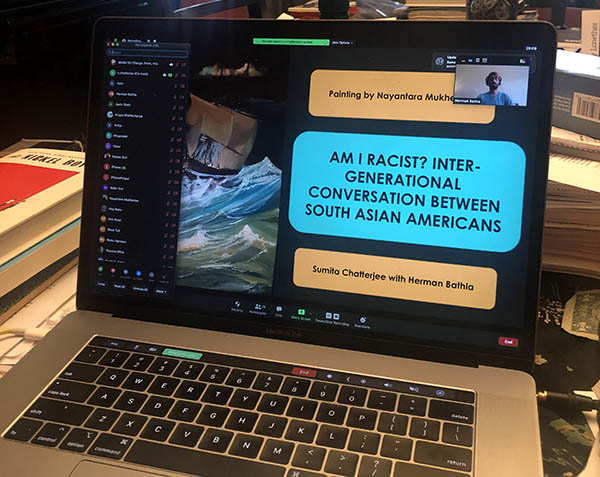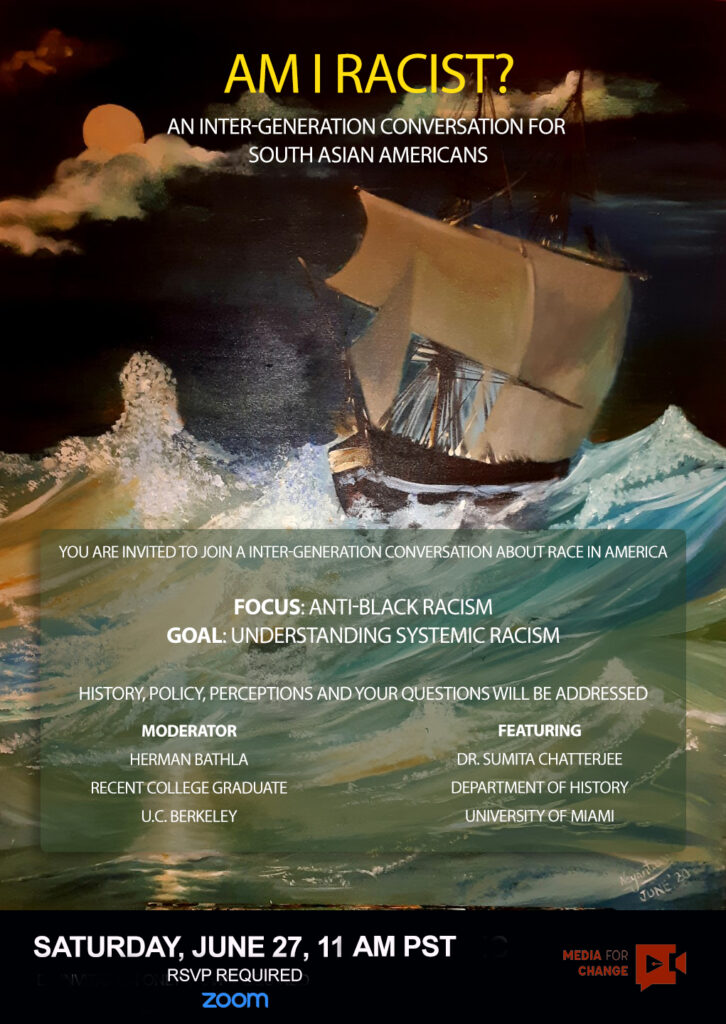
Am I Racist?
Report on an Inter-generational Conversation Among South Asian Americans
by Sumita Chatterjee
This was an inter-generational conversation amongst South Asian Americans – first generation immigrant parents and their second generation college level American children. Sumita Chatterjee led this conversation by presenting some key historical facts around systemic anti-Black racism and South Asian Americans’ differing responses to African American communities – particularly the problems of anti-black racism within this community, and some problematic ways in which members of this community may uncritically subscribe to the myths of “model minority” that Asian American immigrants are often seen in society. Herman Bathla, a second generation South Asian American and fresh graduate from the University of California, Berkeley raised pertinent questions, prompted responses from participants, and moderated discussions that followed.

ART: Nayantara Mukherjee
This event was held via zoom on June 27th. and had 32 participants with a fair and equal representation from both generations, based in the greater Phoenix, AZ area and Miami, Florida. Due to time constraints and the complex and deep history of race and racism in the US, we focused on anti-black racism, and not on other forms of racism such as how South Asian Americans as immigrants and people of color have also faced discrimination in the US. This conversation was primarily to create a space, however uncomfortable, to examine biases within the South Asian American community to which both presenter and moderator belong. The effort was to center the discussion around prejudices and privileges at the individual, interpersonal and, institutional levels, and pay particular attention to an understanding of anti-black systemic racism by drawing on history, policies, and laws. Since the movement for Black Lives, and Black Lives Matter protests erupted all across the nation, triggered by the murders of George Floyd, Breonna Taylor, Ahmaud Arbery by police and vigilantes, we felt that we needed to understand this not simply as an explanation of “one or two bad cops”, but to understand the systemic white supremacist violence that Blacks have faced in this country, by an examination of this history. We looked at policies that have created a racialized criminal justice system, the deep racial inequities, profiling and, unfair sentencing that scaffold policies such as “war on drugs”, and law and order rhetoric since the 1970s. The presentation also touched on the role of media in perpetuating racist stereotypes, the passive voice coverage of police brutality and, active voice in how protestors are reported in media. We briefly touched on the problematic ways in which certain textbooks teach the history of slavery, confederacy and, Jim Crow segregation.
The presentation was interspersed with pauses to raise questions and have discussions around the facts presented. There were some good discussions, particularly by the younger college going participants, but less so by the parents’ generation. On reflection, and going over the feedback, if we are to host similar dialogues, we may do it with a slightly different format, where we give a short reading or a film to watch ahead of the conversation, and
then moderate by focusing on key issues raised in them. It may allow for more engaged participation. While many participants felt that the materials showcased were new and informative, they may have felt hesitant in joining the conversation as they had little time to reflect on the materials shared in the presentation.
Hopefully our conversation allows us to start thinking critically about others who may be different from us, with very different histories and experiences, and find ways to build bridges of understanding, empathy and, trust. This is a small step, but an important one in building a multi-pronged movement for lasting anti-racist social change at all levels: individual, interpersonal and, most importantly, institutional.


